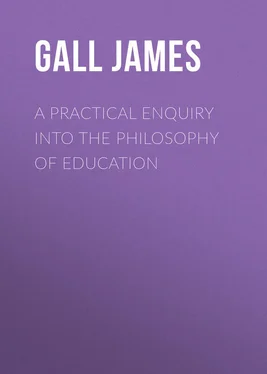James Gall - A Practical Enquiry into the Philosophy of Education
Здесь есть возможность читать онлайн «James Gall - A Practical Enquiry into the Philosophy of Education» — ознакомительный отрывок электронной книги совершенно бесплатно, а после прочтения отрывка купить полную версию. В некоторых случаях можно слушать аудио, скачать через торрент в формате fb2 и присутствует краткое содержание. Жанр: foreign_detective, foreign_antique, foreign_prose, на английском языке. Описание произведения, (предисловие) а так же отзывы посетителей доступны на портале библиотеки ЛибКат.
- Название:A Practical Enquiry into the Philosophy of Education
- Автор:
- Жанр:
- Год:неизвестен
- ISBN:нет данных
- Рейтинг книги:3 / 5. Голосов: 1
-
Избранное:Добавить в избранное
- Отзывы:
-
Ваша оценка:
- 60
- 1
- 2
- 3
- 4
- 5
A Practical Enquiry into the Philosophy of Education: краткое содержание, описание и аннотация
Предлагаем к чтению аннотацию, описание, краткое содержание или предисловие (зависит от того, что написал сам автор книги «A Practical Enquiry into the Philosophy of Education»). Если вы не нашли необходимую информацию о книге — напишите в комментариях, мы постараемся отыскать её.
A Practical Enquiry into the Philosophy of Education — читать онлайн ознакомительный отрывок
Ниже представлен текст книги, разбитый по страницам. Система сохранения места последней прочитанной страницы, позволяет с удобством читать онлайн бесплатно книгу «A Practical Enquiry into the Philosophy of Education», без необходимости каждый раз заново искать на чём Вы остановились. Поставьте закладку, и сможете в любой момент перейти на страницу, на которой закончили чтение.
Интервал:
Закладка:
3. Another law which experience has established as necessary for the perfecting of any of the arts is, a fair and honest application of the successive discoveries of science to its improvement . – This has been the uniform practice in those arts which have of late been making such rapid progress. The artist and mechanic are never indifferent to the various improvements which are taking place around them; nor do they ever stand apart, till they are forced upon their notice by third parties, or public notoriety. There is, in the case of the manufacturer, no nervous timidity about innovation; nor does he ever attempt to deceive himself by ignorantly supposing that the change can be no improvement. – Nor will he suffer himself to be deceived by others. His workmen are not allowed, to save themselves future trouble, to be careless or sinister in their trials of the improvement; for he knows, that however it may be with them, yet if his neighbour succeeds, and he fails, it may prove his ruin.
Such also should be the conduct of the teacher. The time has now gone by when parents were ignorant, either of what was communicated at school, or the manner in which it was taught. The improvement of their children by education, has become a primary object with all sensible parents; and they will never again be satisfied with a school or a teacher, where solid instruction, and the most useful kind of knowledge are not imparted. Ameliorations in his art, therefore, is now as necessary to the teacher, as improvements in machinery are to the mechanic and the manufacturer. It will no longer do for him to say, "I can see no improvement in the change," if the parents of his pupils have been able to discover it; and the teacher who stands still in the present forward march of society, will soon find himself left alone. The practical Educationist, like the mechanician, ought no doubt to be cautious in adopting changes upon chance; but wherever an improvement in his art has been sufficiently proved by fair experiment or long experience, and particularly, when the principle upon which its success depends has been fully ascertained, his rejecting the change on the plea of inconvenience, or from the fear of trouble, is not only an act of injustice to the parents of his pupils, but is a wrong which will very soon begin to re-act upon his own interests. The effect of indifference to improvement in this, as in other arts, may not be felt for a time; but as soon as others have made themselves masters of the improvements which he has rejected, the successive departure of his pupils, and the melting away of his classes, will at last awaken him to a sense of his folly, when it may be too late. Such has usually been the effect of remissness in the other arts; and the present state of the public mind in regard to education, indicates a similar result in similar circumstances.
In connection with this part of our subject, it may here be necessary to remark, that as the experience of all teachers may not be alike in the first working of a newly applied principle, – the principle itself, when fully ascertained, is not on that account to be either belied or abandoned. There are many concurring circumstances, which may make an exercise that succeeds well in the hands of one person, fail in the hands of another; but to refuse credence to the principle itself, because he cannot as yet successfully apply it, is neither prudent nor wise. There are chemical experiments so exceedingly nice, and depending on so many varying circumstances, that they frequently fail in the hands of even good operators. But the chemical principles upon which they rest remain unchanged, although individual students may have not been able successfully to apply them. If their professor has but once fairly and undoubtedly succeeded in ascertaining the facts on which the principle is based, their failure for a thousand times is no proof that the ascertained principle is really a fallacy. In like manner, any important principle in education, if once satisfactorily ascertained, is a truth in the science, and will remain a truth, whoever may believe or deny it. If it has been proved to produce certain effects in certain given circumstances, it will in all future times do the same, when the circumstances are similar. The inability, therefore, of a parent or teacher, to produce equal effects by its means, may be good enough proof of his want of skill, but it is no proof of the want of inherent power in the principle itself. The rings of Saturn which my neighbour's telescope has clearly brought to view, are not blotted from the heavens because my pocket glass has failed to detect them.
It has been by attention to these, and similar rules, that all the secular arts have advanced to their present state; and the art of teaching must be perfected by similar means. There ought therefore to be a distinct object in view on the part of the teacher, – a specific end which he is to endeavour to arrive at in his intercourse with his pupil. For the attainment of this end, he must employ the best and the surest means that are in his power; for the same purpose, he ought honestly and fairly to apply the successive discoveries of science as they occur; and should never allow himself to abandon an exercise founded upon ascertained principles, merely because he at first finds difficulty in putting it in operation.
CHAP. IV
On the Establishment of Sound Principles in Education
The application of the foregoing remarks to our present purpose, is a matter of great practical importance. It has indeed been owing chiefly to their having been hitherto overlooked, that education has been left in the backward state in which we at present find it.
But if, as we have seen, education must bend to the same rigid discipline to which the other sciences have had to submit, – and if teaching can be improved only by following the laws which have determined the success of the other arts – the question naturally arises, "What is to be done now for education?" – "Where are we to begin?" – "How are we to proceed?" – "In what manner are the principles of the science to be investigated, so that they shall most extensively promote the success of the art? and how is the art to be cultivated, so that it may, to the fullest extent, be benefited by the science?" To these enquiries we shall in the present chapter direct our attention.
The method of investigating the operations of Nature in the several sciences is very nearly alike in all. For example, in the science of chemistry, as we have formerly noticed, the first object of the philosopher would be to take a comprehensive view of his whole subject, and endeavour to separate the substances in Nature according to their great leading characteristics. He would at once distinguish mineral substances as differing from vegetables; – and vegetable substances as differing from animals; – thus forming three distinct classes of objects, blending with each other, no doubt, but still sufficiently distinct to form what have been called the three kingdoms of Nature. The various objects included under each of these he would again subdivide according to their several properties; – and as he went forward, he would endeavour, by careful examination and experiment, to ascertain, not only their combinations, but also the characteristic properties of their several elements. The chemist, in this method of investigating Nature, almost always proceeds upwards, analytically, advancing from the general to the special, from the aggregate to its parts, endeavouring to ascertain as he proceeds the laws which regulate their composition and decomposition, for the purpose simply of endeavouring to imitate them. By this means alone he expects to perfect the science, and to benefit the arts.
In the science of Botany, Zoology, Anatomy, Physiology, and almost all the others, the same plan has been adopted with invariable success. The subject, whatever it be, is looked upon as a whole, and then separated into its great divisions; – these again, are subdivided into classes; and these again, into orders, genera, species, and varieties, by which means each minute part can be examined by itself in connection with the whole; the memory and the judgment are assisted in their references and application; and order reigns through the whole subject, which otherwise would have been involved in inextricable confusion.
Читать дальшеИнтервал:
Закладка:
Похожие книги на «A Practical Enquiry into the Philosophy of Education»
Представляем Вашему вниманию похожие книги на «A Practical Enquiry into the Philosophy of Education» списком для выбора. Мы отобрали схожую по названию и смыслу литературу в надежде предоставить читателям больше вариантов отыскать новые, интересные, ещё непрочитанные произведения.
Обсуждение, отзывы о книге «A Practical Enquiry into the Philosophy of Education» и просто собственные мнения читателей. Оставьте ваши комментарии, напишите, что Вы думаете о произведении, его смысле или главных героях. Укажите что конкретно понравилось, а что нет, и почему Вы так считаете.










